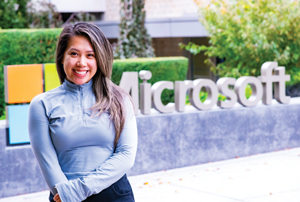
Informatics stretched to the limit: Demand for the Informatics program continues to soar. Support from the state and industry hasn't kept pace.
• Read the story
Through its teaching and research, the University of Washington Information School is helping to support Washington families and power the state workforce.
Our State Impact Report highlights some of the ways the school is benefiting Washington: Meet alumni working across the state; learn about research that's making an immediate impact; and read details about how the Informatics program is growing and how it is producing a net gain of workers for state businesses.
You can also view the State Impact Report in flipbook form or download it as a PDF.
At work in Washington
Most alumni stay to work in all corners of the state. Meet a few of them:
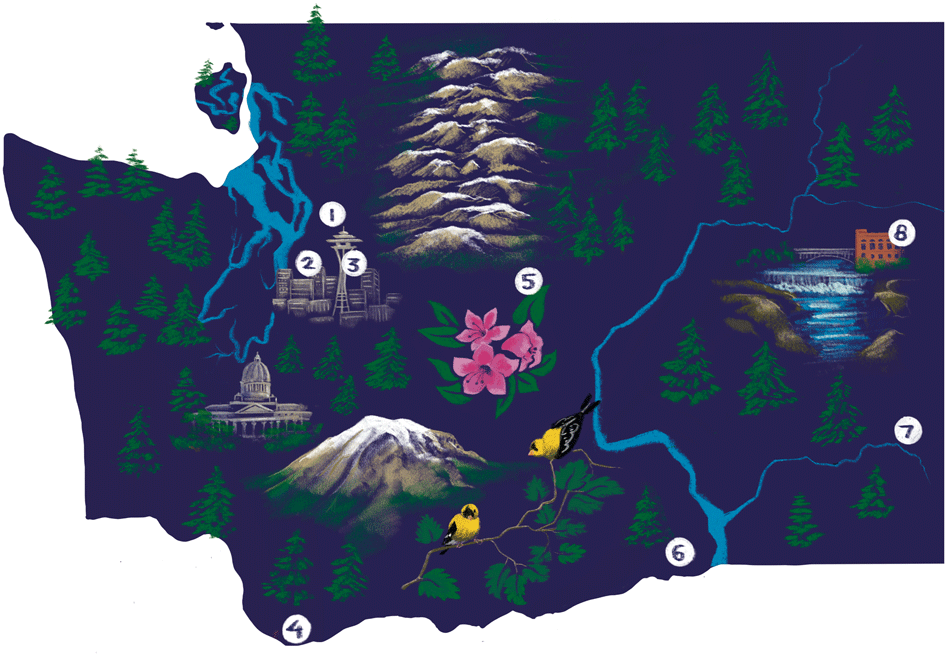
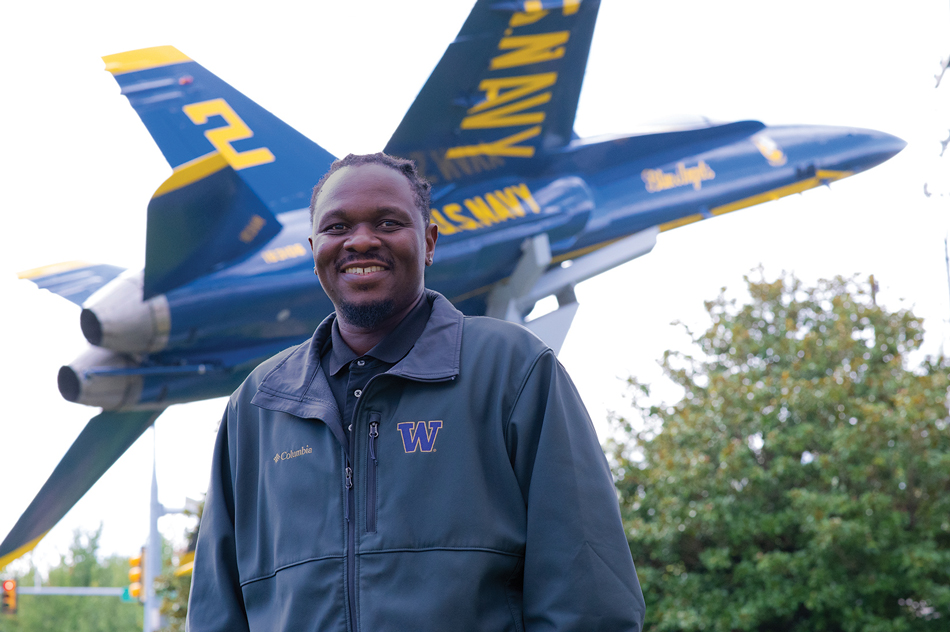
![]() Mark Jupiter Jr.
Mark Jupiter Jr.
MSIM ’23 | Seattle
Mark is a distinguished U.S. Navy veteran who serves as a public key infrastructure administrator and integration specialist at The Boeing Co. In this role, he manages the security of Boeing’s global infrastructure, ensuring the seamless operation and protection of X.509 certificates for applications, devices and servers.

![]() Jeeyoung Kim
Jeeyoung Kim
Informatics ’20 | Seattle
As a software engineer at Amazon, Jeeyoung develops and supports automation for the marketing and sales of Amazon devices. Her responsibilities include implementing automation services, reviewing peers’ work, and writing design documents for features, with a focus on enhancing efficiency and driving global growth.
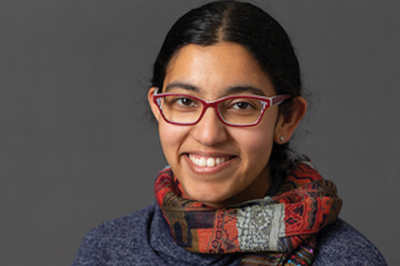
![]() Sonali Mishra
Sonali Mishra
Ph.D. ’19 | Seattle
As principal UX researcher in the Data Science Lab at Fred Hutchinson Cancer Research Center, Sonu collaborates with scientists, developers, trainers and others to design and evaluate tools for bioinformatics researchers. Her work helps researchers do their work more efficiently and reproducibly in the race against cancer.
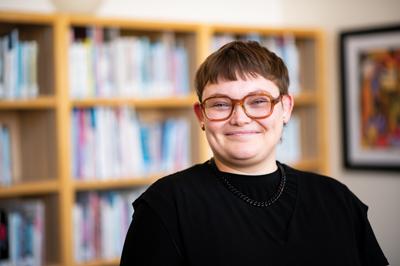
![]() Sam Buechler
Sam Buechler
MLIS ’20 | Vancouver
Sam is the library director at Washington State University Vancouver. In their role, they oversee the day-to-day and long-term operations of the library. This includes stewarding a team of library workers and mentoring faculty through tenure and promotion. Sam also does liaison work such as teaching and collection development.
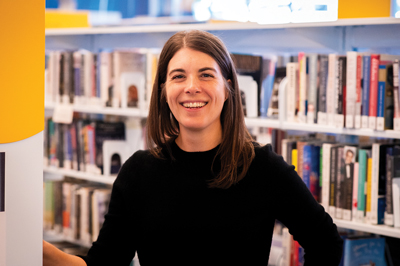
![]() Kim Neher
Kim Neher
MLIS ’15 | Wenatchee
NCW Libraries provides 30 libraries, a bookmobile, and mail order service for 280,000 people in a rural five-county service area. As deputy director, Kim oversees public services including branch operations, programs, collections, outreach, marketing and facilities, leveraging each department to meet the region’s critical needs.
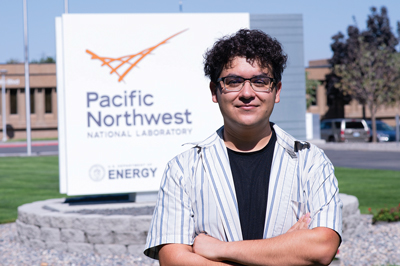
![]() Thomas Serrano
Thomas Serrano
Informatics ’22 | Richland
Thomas is a data engineer who helps accelerate research at the Pacific Northwest National Laboratory by creating software solutions in labs. He helps create data dashboards and ETL pipelines that reside alongside lab instruments that allow researchers to tame the vast amounts of data they create.
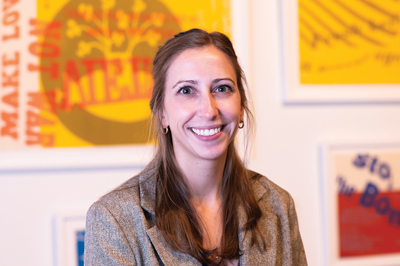
![]() Kira MacPherson
Kira MacPherson
Museology ’21 | Pullman
Kira joined the Jordan Schnitzer Museum of Art at Washington State University in 2022. As the director of development, she communicates with museum friends and donors, creating connections between people and their interests in the arts, while fundraising for the museum’s programs, exhibitions and operations.
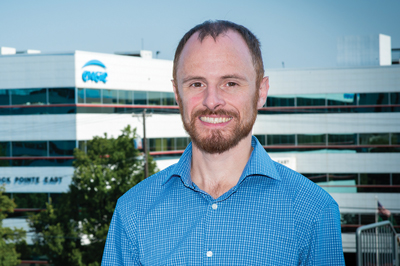
![]() Nicholas Pace
Nicholas Pace
MSIM ’23 | Spokane
As an operations specialist, Nicholas is part editor, part reporter, and part analyst for Engie, an energy consultancy that partners with commercial organizations to reduce greenhouse gases and improve energy efficiency. He analyzes clients’ utility bills so that the data is accurate, complete, up-to-date and beneficial.
Research supports Washington communities
Information School research makes an impact across the state, supporting access to trusted information and a more just, healthier future. Some examples:
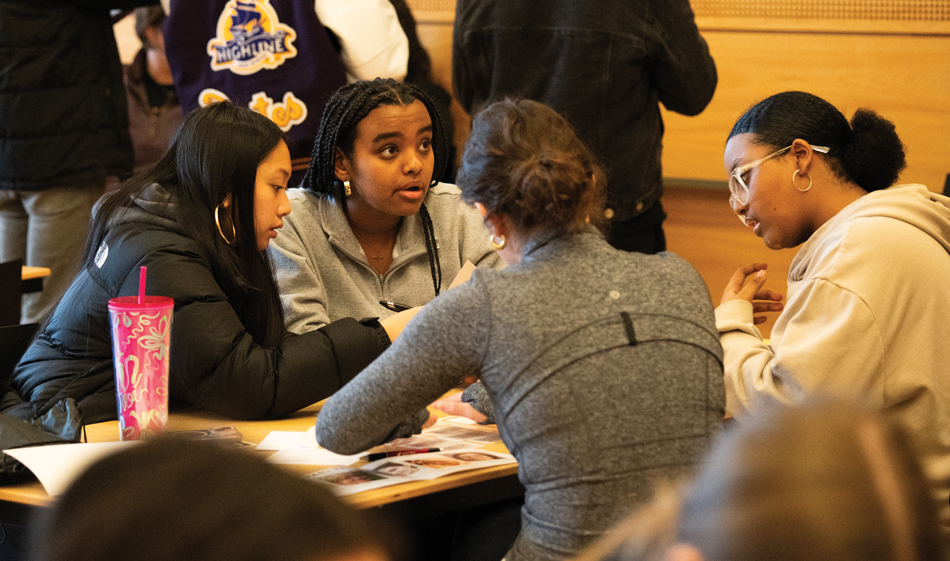
Promoting information literacy
MisinfoDay is an annual event bringing high school students, teachers and librarians to university campuses to learn how to navigate complex information environments and make informed decisions about what to believe online. It features interactive workshops and learning activities, including a misinformation-themed escape room game. The annual event, which originated as a project led by then-graduate student Liz Crouse and Professor Jevin West, is co-hosted by the Information School’s Center for an Informed Public and Washington State University’s Edward R. Murrow College of Communication. The high school students shown above were among more than 1,000 Washington students, teachers, librarians and other educators who participated in 2024.
Protecting kids from dark patterns
Companies use “dark patterns” in their interface designs to manipulate user behavior and increase profits. Their software encourages kids to disclose data about themselves, make purchases, and stay online longer than they otherwise would. Associate Professor Alexis Hiniker identifies dark patterns and what makes them problematic. She shares these patterns with industry and policymakers, who are increasingly receptive to measures curbing the harmful effects of technology on children. Hiniker’s research was used to inform a Federal Trade Commission report on dark patterns.
Educating the public about AI
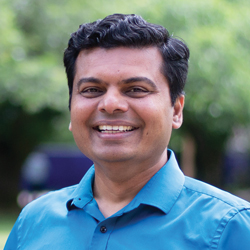 Artificial intelligence and machine learning are creating new challenges and opening new frontiers in public policy. Professor Chirag Shah has become a leading expert voice for fairness and responsibility in AI. He testified before the Washington State Legislature in support of bills to boost AI accountability and combat algorithmic discrimination; has presented to judges this year in Walla Walla, Yakima and Tulalip; and gave a talk titled “AI Promises, Perils, and Paths” at the Washington State Superior Court Judges Conference. He also gave a keynote talk at TEDxUofW on the topic.
Artificial intelligence and machine learning are creating new challenges and opening new frontiers in public policy. Professor Chirag Shah has become a leading expert voice for fairness and responsibility in AI. He testified before the Washington State Legislature in support of bills to boost AI accountability and combat algorithmic discrimination; has presented to judges this year in Walla Walla, Yakima and Tulalip; and gave a talk titled “AI Promises, Perils, and Paths” at the Washington State Superior Court Judges Conference. He also gave a keynote talk at TEDxUofW on the topic.
Closing the digital divide
The digital divide in Washington is a significant barrier to equal opportunity and economic growth. Many residents lack access to high-speed internet and the digital skills necessary to thrive in today’s digital economy. Teaching Professor Cindy Aden is among the state’s leading voices for bridging the divide. She and her colleagues, a group known as Washington Digital Equity Partners, are calculating the true cost of providing digital skills training around the state and drafting proposed legislation for a device tax to address these costs.
Supporting public health
 Scientific papers can be daunting, with convoluted findings, baffling jargon and key takeaways buried in a blur of details. Assistant Professor Lucy Lu Wang uses artificial intelligence to make these documents more accessible and usable, bringing advances to patients more quickly. For example, Wang and her team were quick to respond to the wave of scientific documents after COVID-19 broke out. They helped other researchers create a text-mining database to dig up nuggets of relevant information for those trying to keep up. The database evolved along with knowledge about the virus.
Scientific papers can be daunting, with convoluted findings, baffling jargon and key takeaways buried in a blur of details. Assistant Professor Lucy Lu Wang uses artificial intelligence to make these documents more accessible and usable, bringing advances to patients more quickly. For example, Wang and her team were quick to respond to the wave of scientific documents after COVID-19 broke out. They helped other researchers create a text-mining database to dig up nuggets of relevant information for those trying to keep up. The database evolved along with knowledge about the virus.
Promoting AI fairness
Artificial intelligence is used to screen job candidates, review college student applications, and make health-care decisions. But because AI is trained on data produced by humans, it learns biases similar to those found in society. It discriminates against women and people of different ethnicities more frequently than white males. Assistant Professor Aylin Caliskan is dedicated to thwarting these effects. She was awarded $603,342 from the National Science Foundation and $1,043,249 from the National Institute of Standards and Technology to identify, measure and reduce bias in AI.
Expanding access to computing education
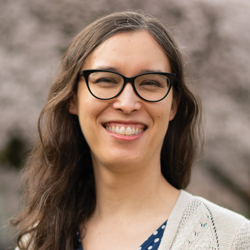 Less than 10 percent of students in Washington public and tribal high schools took a class in computing last year due to a lack of qualified teachers or a belief that courses are not “for them.” Professor Amy J. Ko, an advocate for state funding to make justice-focused computer science education available to every student, is bringing together researchers, K-12 teachers, policymakers and private companies to tackle these challenges. Her efforts are bolstered by a new collaboration at the UW called the Center for Learning, Computing and Imagination.
Less than 10 percent of students in Washington public and tribal high schools took a class in computing last year due to a lack of qualified teachers or a belief that courses are not “for them.” Professor Amy J. Ko, an advocate for state funding to make justice-focused computer science education available to every student, is bringing together researchers, K-12 teachers, policymakers and private companies to tackle these challenges. Her efforts are bolstered by a new collaboration at the UW called the Center for Learning, Computing and Imagination.
Students flock to Informatics
More than ever, the Information School’s undergrad program attracts diverse cohorts and strengthens the state workforce.
Informatics students at the University of Washington gain a deep understanding of information in society while creatively imagining more equitable and just information technology and systems. The major is in high demand because it produces well-rounded information and technology professionals who land satisfying, good-paying jobs — most of them in Washington.
Informatics grads can be found across public, private and nonprofit organizations as software engineers, web developers, user experience designers, usability engineers, project managers, and in many other roles.
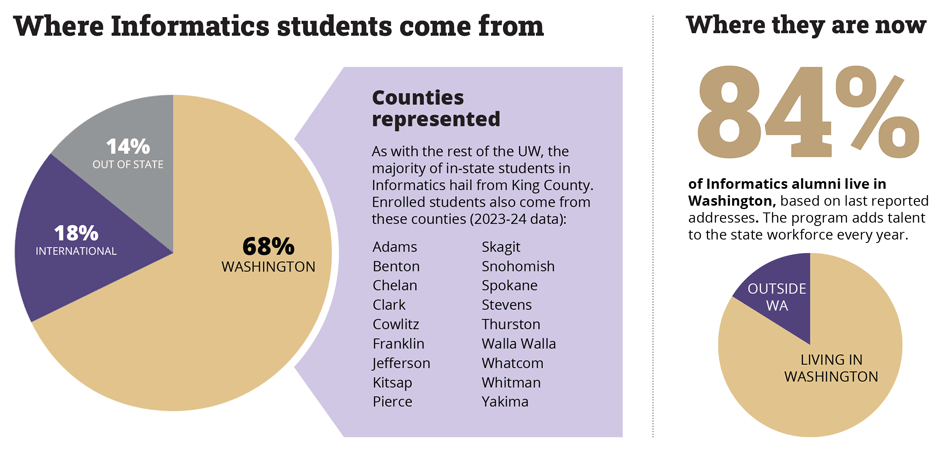
Top employers
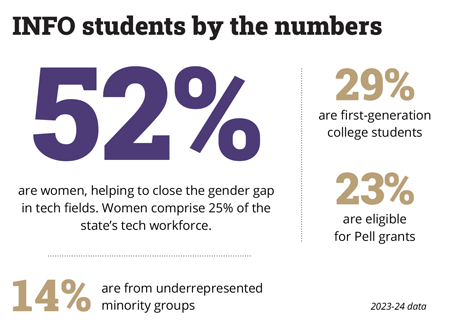 Top 20 first employers reported by Informatics graduates (2013-2023 data):
Top 20 first employers reported by Informatics graduates (2013-2023 data):
- Microsoft
- Amazon/AWS
- Liberty Mutual Insurance
- Accenture
- University of Washington
- Boeing Co.
- Nordstrom
- Avanade
- Deloitte
- T-Mobile
- Starbucks
- Oracle
- PwC
- West Monroe Partners
- Workday
- Facebook/Meta
- SAP Concur
- Visa
- Expedia
Graduates are working across all sectors, at large and small companies and startups. 27% report a unique employer.

> Read more about the growth of Informatics and the struggle to keep pace with rising demand for the program.
Attracting top talent
Each year, the Husky 100 recognizes students making the most of their UW experience inside and outside the classroom. Informatics attracts students who are highly engaged in their communities and want to make an impact. Out of more than 60,000 UW students each year, Informatics has had an outsized number of honorees, with 28 since 2019.
What's on the horizon
The Information School has much to be proud of, but more progress is needed to fulfill its public promise and support Washington families, employers and communities.
Our priorities
- The school needs to align its Informatics enrollment with the high and rising demand among students applying to the major. Too many qualified students are denied admission simply due to a lack of capacity.
- Expanded high school outreach programs, especially in diverse communities across Washington, will help the school strengthen the direct-to-major pathway for Informatics and ensure its student body reflects the diversity of the state.
- Direct-to-major undergrads, many of them first-generation students, require additional support to adapt to college and succeed. More teaching capacity and advising staff is needed to ensure they not only enroll, but graduate and thrive in their careers.
- A home for the Information School on the UW campus will support collaboration and community building across all of its programs, foster interdisciplinary research, and help the school attract and retain top talent.
How you can help
The Information School needs state lawmakers and industry leaders to invest in its future. In the coming months and years, it will make its case to the university, the Legislature and the public for those investments. Alumni and friends can help by loudly and proudly supporting the school.
How are you making a difference, and how has the Information School supported you? Share your impact story and tag us on LinkedIn, Bluesky, Instagram or Facebook.
